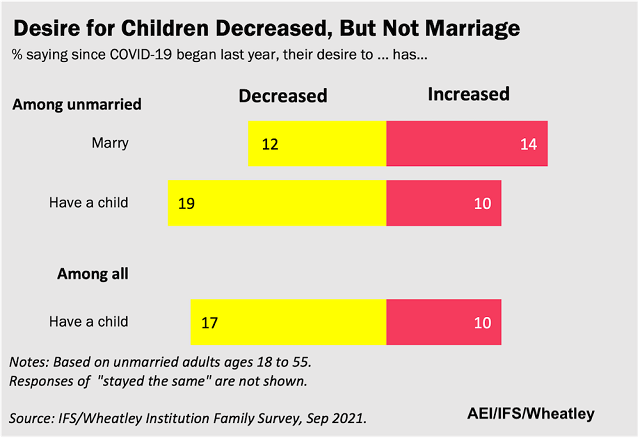Penna Dexter
The Institute for Family Studies and the Wheatly Foundation recently published a report about Americans’ attitudes regarding marriage and child-rearing. Its title is, “The Divided State of Our Unions: Family Formation in (Post-) Covid-19 America.” It shows the “desire to marry” has ticked up a bit overall since the onset of Covid, while “the desire to have a child” dropped. But, the study reveals deepening “economic, religious, and partisan divides in family formation” and describes the reasons “the rich, the religious and Republicans” have a “relatively greater propensity” to marry than lower-income, less religious Americans.
There’s good news and bad news in this report. Downward trends in divorce, teen pregnancy, and abortion rates continue. But there’s a certain disturbing disengagement behind some of this. Fewer marriages translate to fewer divorces. Teen sex, pregnancy, and abortion, happily, are down, but so is teen dating.
Yuval Levin of the American Enterprise Institute explains that contemporary social science, including this report, reveals a change in “the basic character of social breakdown in America.” For generations, the core problem has been: “Americans living their lives out of order — having sex too soon, becoming parents too early….without restraint or preparation.” He calls these “pathologies of unruliness.”
We have added another pathology: “disordered passivity.”
In an article at The Dispatch, Yuval Levin writes: “There is less social disorder, we might say, because there is less social life. We are doing less of everything together, so that what we do is a little more tidy and controlled.”
Our society possesses “institutions of restraint” on our impulses. “Marriage channels and domesticates human longings.” Now we must ask, “what if we fail to act on our longings to begin with?” Many young people are risk-averse, waiting too long — maybe forever — to “get on with it.”
A terrible result is the decline of marriage. And the decline of childbearing: America is well below the population replacement rate.
The church must speak into this passivity.
 Listen Online
Listen Online Watch Online
Watch Online Find a Station in Your Area
Find a Station in Your Area










 Listen Now
Listen Now Watch Online
Watch Online
